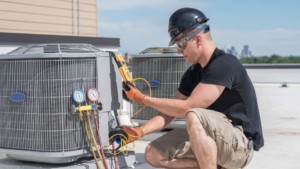 Anyone who wants to remain comfortable in their home needs a reliable air conditioner. They give you control over your internal environment, regardless of how warm it is outside. However, no air conditioning system lasts forever. Eventually, it will have to be repaired or replaced. Here are seven signs your air conditioner is due for an upgrade:
Anyone who wants to remain comfortable in their home needs a reliable air conditioner. They give you control over your internal environment, regardless of how warm it is outside. However, no air conditioning system lasts forever. Eventually, it will have to be repaired or replaced. Here are seven signs your air conditioner is due for an upgrade:
1. Rising Costs
If your energy bills have been steadily creeping up, it might be a sign your air conditioner is working harder to regulate temperatures in your home and maybe nearing the end of its life.
Because they’re run more often, air conditioners in hot climates tend to wear out faster, but there are a few other factors that can shorten their lifespan.
- Upkeep. Regular maintenance is important to the health of your air conditioner. Hiring a technician to clean the condenser coils, lubricate moving parts, calibrate your thermostat, tighten your electrical connections, and inspect the motor assembly will help the unit function longer.
- Weather. Unsheltered air conditioners are more likely to get clogged with debris and corrosive particles. Seaside homes have to deal regularly with salty air, for example. Moisture can collect inside and damage parts. Your air conditioner might even develop mold, especially in regions where it’s left inactive for months at a time. Of course, air conditioners are designed to withstand the elements, but over time, exposure to harsh weather will lead to problems.
- Poorly Positioned Thermostat. Placing your thermostat in direct sunlight, near windows, or close to major appliances (e.g. oven) can cause it to misread the air temperature and overwork your air conditioner. Choose a secluded spot for your thermostat. Hallways and corridors generally work best.
2. Uneven Temperatures
Air conditioners are supposed to pump air evenly through your home. So, if one side is cool and comfortable while the other’s blazing hot, you’ve got a problem. Inconsistent temperatures don’t necessarily mean your air conditioner is worn out though. You could have blocked or leaky ducts. Use EnergyGuard to see if there’s a problem with your ventilation system. However, if our experts can’t find a problem, a new air conditioner might be the only solution.
3. Strange Noises
Air conditioners should produce a quiet, consistent hum when activated. If you hear loud and unexplained noises instead, it could be a sign of a bigger problem, such as loose parts, a failing motor, or malfunctioning cooling coils.
4. Strange Odors
Another sign of a deep, internal problem. Odors can be caused by mold, mildew, or a refrigerant leak. Call an expert out to investigate. If the problem is still in its early stages, the situation can probably be salvaged. If not, you may need to invest in a new unit.
5. Tripped Circuits
HVAC companies do their best to calibrate air conditioners to your home’s electrical system to prevent them from straining your electrical budget. However, as they age, AC units end up working harder to cool your home.
An air conditioner that occasionally trips a circuit isn’t a problem. There could be any number of things overloading your wiring. The AC might only be a contributing factor. However, if the circuits go out routinely whenever your air conditioner is on, it’s time to consider replacing it.
6. Frequent Repairs
As noted above, regular upkeep extends the life of your air conditioner. But if you’re calling the repairman frequently, then it’s a sign your air conditioner is wearing out. Repairs are generally less expensive than buying a new unit, but they add up over time. In the long run, you’ll probably save more money purchasing a new one.
Customers enrolled in our EnergyGuard program see even greater savings. Its repair protections cover their central heating and cooling systems, ensuring they don’t have to pay out of pocket in the event of an unexpected breakdown.
7. Your Air Conditioner is Over Ten Years Old
The average air conditioner lasts 10-15 years. With regular maintenance and good shelter, it might last longer. But if you’re encountering problems past the 10-year mark, it’s a sign the end is near. Since newer models tend to be more efficient, upgrading your air conditioner might not only reduce maintenance and repair costs but cut your energy costs as well.